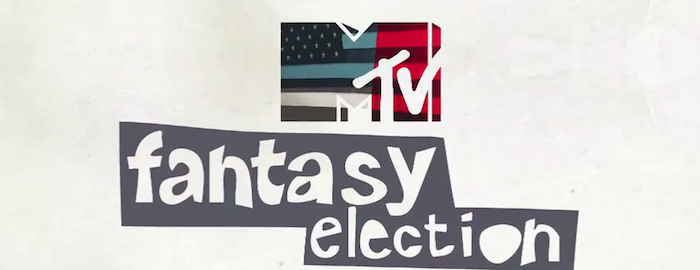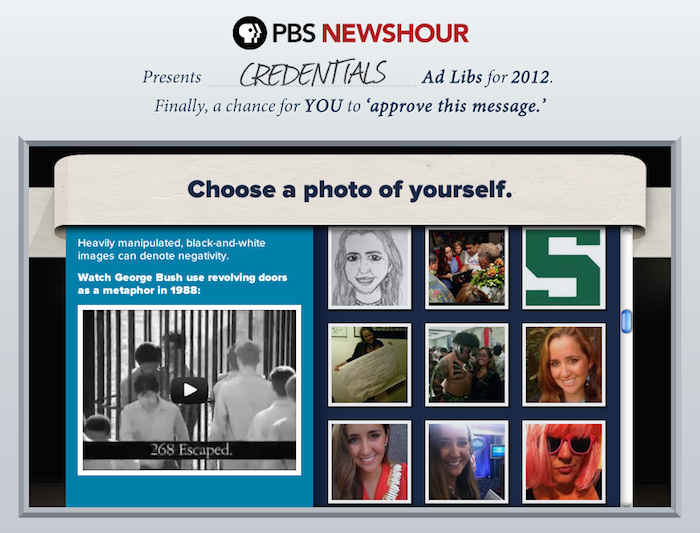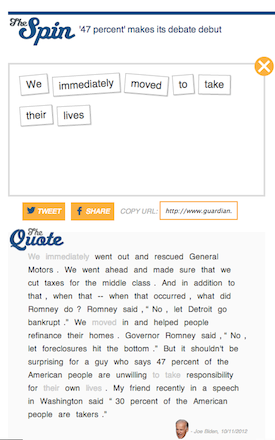

Wanna make your own over-the-top Bobby Newport-style political attack ad?
PBS NewsHour is on it. This week it launched Ad Libs 2012, an interactive feature that has you pick quotes and photos from your own Facebook profile and cobbles them together in an attack ad against yourself.
The idea is to engage voters by highlighting some of the oldest campaign-ad tricks in the book: Roiling storm clouds, ominous voiceovers, out-of-context quotes, and so on. As you build your campaign ad, PBS NewsHour features links to various historical ads, pointing out tactics used to denote negativity. Check it out:

Ad Libs 2012 was created using Mozilla’s Popcorn toolkit, and the team at PBS NewsHour collaborated with Mozilla and Ocupop. (The project was funded by a grant from the Corporation for Public Broadcasting.)
PBS NewsHour’s creative director, Travis Daub, says they opted to build something linked to Facebook to keep things simple — users don’t have to upload any photos or text because Ad Libs 2012 uses what’s already in their Facebook profiles — and so that people can only make attack ads about themselves. “We were quite frankly concerned about people misusing it, taking the tool and using it to bully other kids in high school,” Daub told me.
Plenty of other organizations have found ways to use Facebook for election-related games. Over the summer, MTV launched Fantasy Election ’12, in which players pick teams of presidential and congressional candidates who get points for honesty, polling well, and social media engagement. Honolulu Civil Beat created its own civics-oriented Facebook game, Our Hawaiian Spring, with a goal to encourage voter turnout in Hawaii, where it’s the lowest in the country. (Disclosure: I’m a contributing reporter at Civil Beat, where I used to work full time.)
 After the vice presidential debate last night, The Guardian introduced a feature called “Spin It!” which is kind of like a politically-themed digital version of magnetic poetry. It lets you select words from Joe Biden and Paul Ryan quotes to form misleading sentences.
After the vice presidential debate last night, The Guardian introduced a feature called “Spin It!” which is kind of like a politically-themed digital version of magnetic poetry. It lets you select words from Joe Biden and Paul Ryan quotes to form misleading sentences.
Politically oriented or not, the team over at BuzzFeed often finds ways to interact with readers. Recent example: Make Your Own Paul Ryan Photoshoot. That project skews goofy where other news organizations go a bit wonkier, but the idea is the same: Bring people together to play in the election space.
PBS NewsHour’s Hari Sreenivasan says the gamification of the election makes sense for the first time this year: Many newsrooms are more willing to try new things, and audiences’ expectations about social interactivity have shifted. Elections-related interactivity used to mean voting in a web survey about who you liked better in a debate, or taking an issues quiz to see which candidate shared your views. Those kinds of features, while still around, now seem positively quaint.
“Thanks to all of these different apps, the different level of capability of how content is created and how it’s interactive, they have a different level of expectation and a different level of understanding,” Sreenivasan told me. “If you threw this in front of someone five years ago, they would flip out. This is a whole level of shared knowledge that we didn’t have before.”